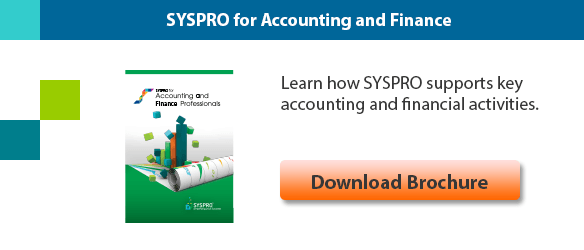In a recent article by Paul Taylor in the Financial Times, he discusses the changing dynamics of the C-suite. He looks at the strong trend towards collaboration among roles as opposed to the multiple silos that we have seen in the past. Taylor talks to how CIOs, who have in the past focused primarily on IT, now need to be well-versed across a myriad of business responsibilities. In turn, the CEO and CFO need to understand IT and its role in the company.
Let’s look a little further into the role of the top financial executive within an organization…
When most of us think of accounting, we tend to view it as a bean counting role restricted to numbers – all about accounts and reports. In reality, though, accounting today is a management support function, as Chief Financial Officers’ responsibilities extend to include: governance, corporate social responsibility, risk and environmental management and information systems such as SYSPRO.
There’s no doubt that the role of the CFO or top financial executive and the additional areas of accountability have changed more drastically in the years since the market crash, than in the preceding century. Strategic management has become critical, and top priorities span:
- Growth via preparation
- Honesty and transparency
- Continuous feedback
- Multiple perspectives
- Accountability and ownership
To add to this, the King Report on Corporate Governance recommends further extending the responsibility of a company’s board. On a worldwide basis, these corporate governance directives have highlighted the so-called triple bottom line, in which companies are required to account not only for economic and financial issues, but also for social and environmental issues.
King III builds on this principle by emphasizing sustainability. With this, executives have an accountability to shareholders and an obligation to all stakeholders (including shareholders) to ensure that the company’s resources are utilized to maintain the continuing viability of the company. This involves not only environmental sustainability (resource management with an eye on future needs), but also issues such as social responsibility (ensuring a positive impact on the community within which the company operates), respect for human rights, and the effective management of stakeholder relationships.
All of this said, it’s clear that the economic value of a company today extends way beyond the balance sheet. SYSPRO’s financial solutions recognize this and are geared to help financial executives tackle mulitple priorities by providing comprehensive financial and cost accounting functionality and controls. SYSPRO also includes many features that assist with regulatory, governance, risk and compliance adherence. Financial data is always current due to real-time integration between SYSPRO financial, distribution and manufacturing solutions. Financial processes can be extended to the web or integrated to other applications using SYSPRO e.net Solutions.
Are you a financial executive that can bear testimony to this significant evolution of your role in recent years? We would love to hear your story!








